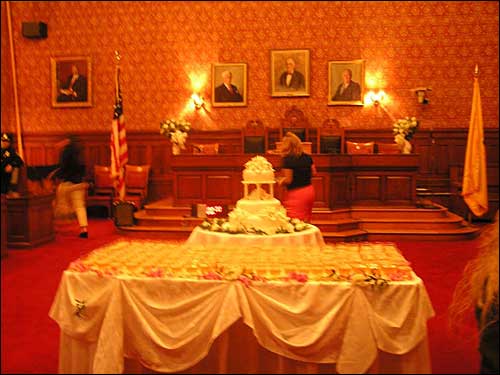There are histories that we, in the year 2004, don't fully comprehend. We are probably AWARE of the legacies of race in our country, but we fail to internalize them and acknowledge that these histories have lead to huge disparities between white people and people of color.
I think the article below best illustrates how this works. I wouldn't normally reprint the entire article on this blog, but I felt it too important not to include every single word.
Please take a few minutes to read the following short article and to contemplate it. Click HERE to go directly to the article on the Common Dreams website.
Climbing the White Escalator
by Betsy Leondar-Wright
"America is a meritocracy," my father always told me. The harder he worked, the more money he got: clear cause and effect. From individuals' prosperity or poverty, he believed he could determine their effort and talent. Therefore the poor black people in a nearby city clearly hadn't applied themselves.
My father had a legacy that he couldn't see, a legacy he only got because he is white. His ancestor, John Prescott, came from England in 1638. The Massachusetts Bay Colony granted him land in Central Massachusetts something no people of color got -- and he built the first sawmill there. As far as I can tell, none of his descendants have ever been poor. Some of my ancestors moved west to Ohio in the 1800s, where they may have received land under one of the Homestead Acts government programs closed to people of color.
My father is a World War II-era veteran, and he went to graduate school on the GI Bill. Most veterans of color were unable to access these education benefits. The few black colleges were swamped with applicants, and most other colleges accepted white students only. Job training programs in the South were segregated and under local white control. African Americans were one-third of the WWII vets in the South but got one-twelfth of the job training slots.
My parents bought our first house with a Veterans Administration mortgage. The cheap subsidized mortgages of that era could not be used in mixed-race neighborhoods, or in inner cities. Because most banks issued only government-subsidized mortgages, most WWII veterans of color had to remain renters.
My father's parents got Social Security old-age benefits, which spared my father from supporting them. This enabled him to pay for our college educations. Social Security initially excluded domestic and agricultural workers, which meant that most people of color did not qualify in the first decades of the program. The minimum wage still excludes agricultural workers. The parents of today's middle-aged people of color typically had to support their own parents, and so couldn't save for college tuition as easily as my parents saved for mine.
Of course effort and talent make a difference in climbing the staircase to prosperity. But for most white men, the staircase has been an escalator powered by public assistance. I saw this in my own family. My father had a relative who was unambitious, sweet but slow-thinking. He got a middle-management job and stayed in it for decades, and lived in the same small house until he retired with a pension. He was carried gently up the escalator, ending up lower than my dad, who put a lot of effort into climbing and so reached upper management. That was the range for college-educated WASP men of their generation: middle-management and small homes, or high-level jobs and big homes. They started in the middle of the staircase and got help to rise. Working-class white men may have started at the bottom, but in that era they had opportunities and assistance to climb upward.
Historically, for people of color, the escalator has been broken. Sometimes they have had to hike up a fast-moving down escalator. No matter how hard they worked, they rarely got the same rewards as white people. Their wages were lower, and many neighborhoods and schools were closed to them. In some eras and places, laws and violence kept them off the staircase to prosperity entirely.
Civil rights legislation has allowed people of color to step onto the staircase. But there's no GI Bill today. The more recent government programs open to people of color, such as welfare and Food Stamps, have been tiny compared with the vast assets conferred on whites by the Homestead Acts and the GI Bill. And these recent programs have only helped with immediate living expenses, not college, home ownership, or other assets that provide security for coming generations. People of color have recently become homeowners in greater numbers thanks mostly to their own savings, without the kind of substantial government assistance that white families got in the 1950s and 1960s.
Government boosts for white people were invisible to my father. He opposed government hand-outs as destroying incentives to strive, without considering the hand-outs his family had received. In truth, prosperity comes from a mixture of individual effort and assistance from family and government. America won't be a meritocracy until the escalator rises at the same speed for everyone.
Betsy Leondar-Wright (bleondar-wright@faireconomy.org) is the Racial Wealth Divide communications director at United for a Fair Economy.













